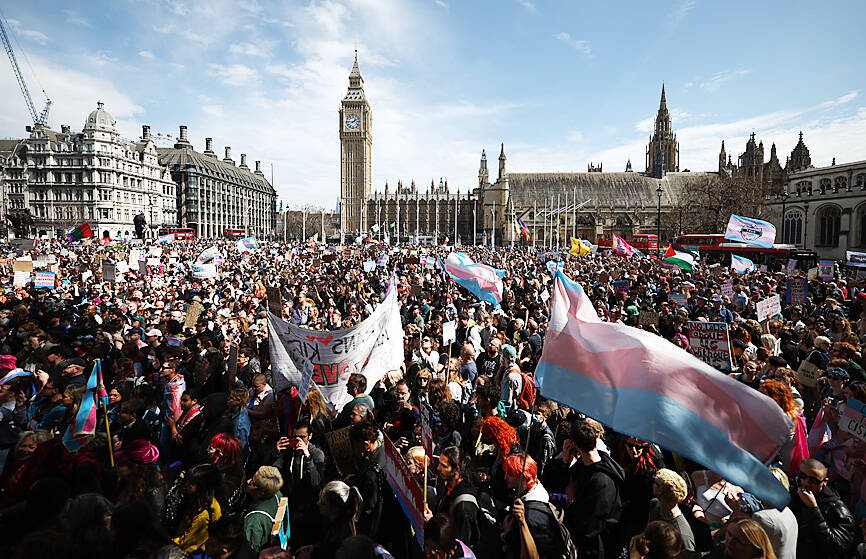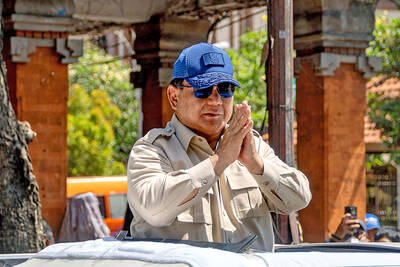Thousands of people on Saturday rallied in London and Edinburgh in support of trans rights, after a landmark UK court ruling on the definition of a “woman.”
The British Supreme Court on Wednesday last week ruled that the legal definition of a “woman” is based on a person’s sex at birth, with potentially far-reaching consequences for how single-sex spaces and services are run.
Outside the UK parliament in London, activists, protesters, trade unions and community groups waved flags and held up banners with slogans such as “trans women are women” and “trans rights are human rights.”

Photo: EPA-EFE
“My main fear — the extremists will feel empowered by this decision,” said Eevee Zayas, a 32-year-old researcher from Spain, describing themself as non-binary transgender.
“Hate crimes against [the] trans community [will] go up,” Zayas added.
The court ruling said single-sex spaces and services including changing rooms, toilets and women-only hospital wards “will function properly only if sex is interpreted as biological sex.”
Joe Brown, a trans woman in the process of transitioning, said that “everything in the transition is going to be harder.”
“Coming here in big numbers is very important to stand against the Supreme Court decision,” Brown said.
Other fears included not being able to access healthcare and children being scared to come out as trans, Brown said.
London’s Metropolitan Police said it was investigating after seven statues “in the vicinity of the protest” were vandalized.
At least two statues in Parliament Square were daubed with graffiti during the rally including one of suffragette Millicent Fawcett, who was part of the campaign to secure the vote for women in the early part of the 20th century.
Last week’s court ruling followed a legal battle between the Scottish government and a campaign group For Women Scotland involving clashing interpretations of the Equality Act.
While the Scottish government argued that the law gave trans women with a Gender Recognition Certificate the same protections as a biological female, the campaign group disagreed.
In the Scottish capital Edinburgh, thousands more protesters marched.
Lauren Yeoman, 38, said she was “disgusted” by a ruling she felt effectively removed the human rights of trans people.
“We’re pointing fingers at people who aren’t harming anybody, such as trans people, while ignoring the real problems,” she said.
Speakers addressed the crowd using megaphones, and led the demonstrators in chants that included: “When trans rights are under attack, what do we do? Fight back.”

DEADLOCK: Putin has vowed to continue fighting unless Ukraine cedes more land, while talks have been paused with no immediate results expected, the Kremlin said Russia on Friday said that peace talks with Kyiv were on “pause” as Ukrainian President Volodymyr Zelenskiy warned that Russian President Vladimir Putin still wanted to capture the whole of Ukraine. Meanwhile, US President Donald Trump said that he was running out of patience with Putin, and the NATO alliance said it would bolster its eastern front after Russian drones were shot down in Polish airspace this week. The latest blow to faltering diplomacy came as Russia’s army staged major military drills with its key ally Belarus. Despite Trump forcing the warring sides to hold direct talks and hosting Putin in Alaska, there

North Korea has executed people for watching or distributing foreign television shows, including popular South Korean dramas, as part of an intensifying crackdown on personal freedoms, a UN human rights report said on Friday. Surveillance has grown more pervasive since 2014 with the help of new technologies, while punishments have become harsher — including the introduction of the death penalty for offences such as sharing foreign TV dramas, the report said. The curbs make North Korea the most restrictive country in the world, said the 14-page UN report, which was based on interviews with more than 300 witnesses and victims who had

COMFORT WOMEN CLASH: Japan has strongly rejected South Korean court rulings ordering the government to provide reparations to Korean victims of sexual slavery The Japanese government yesterday defended its stance on wartime sexual slavery and described South Korean court rulings ordering Japanese compensation as violations of international law, after UN investigators criticized Tokyo for failing to ensure truth-finding and reparations for the victims. In its own response to UN human rights rapporteurs, South Korea called on Japan to “squarely face up to our painful history” and cited how Tokyo’s refusal to comply with court orders have denied the victims payment. The statements underscored how the two Asian US allies still hold key differences on the issue, even as they pause their on-and-off disputes over historical

CONSOLIDATION: The Indonesian president has used the moment to replace figures from former president Jokowi’s tenure with loyal allies In removing Indonesia’s finance minister and U-turning on protester demands, the leader of Southeast Asia’s biggest economy is scrambling to restore public trust while seizing a chance to install loyalists after deadly riots last month, experts say. Demonstrations that were sparked by low wages, unemployment and anger over lawmakers’ lavish perks grew after footage spread of a paramilitary police vehicle running over a delivery motorcycle driver. The ensuing riots, which rights groups say left at least 10 dead and hundreds detained, were the biggest of Indonesian President Prabowo Subianto’s term, and the ex-general is now calling on the public to restore their